Black as Knight: Equine Symbolism in Game of Thrones
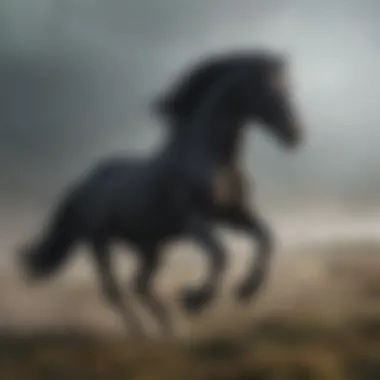
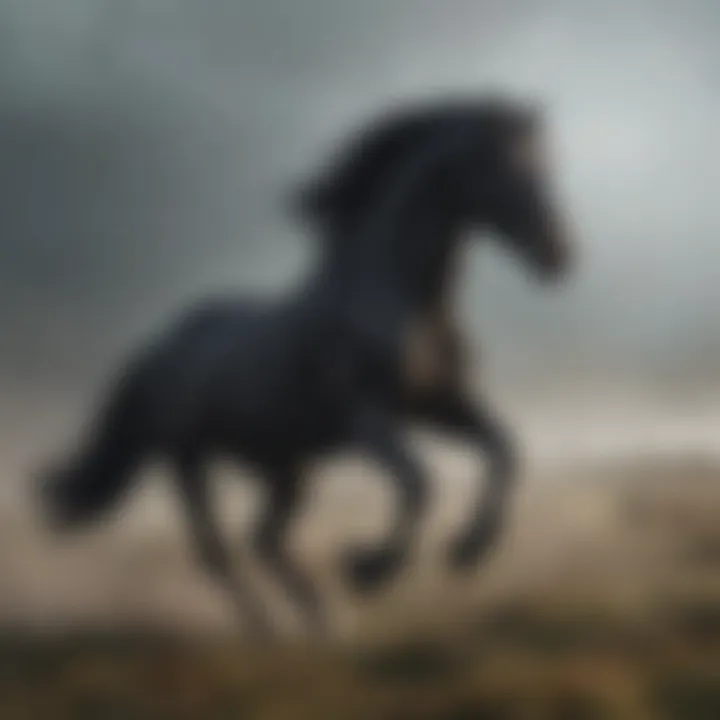
Intro
The world of Game of Thrones is notable for its intricate characters and vast thematic elements. Among various symbols presented throughout the series, the black horse stands out remarkably. This exploration delves into the profound implications of these dark steeds, illustrating how they are interwoven with the narratives of power, legacy, and the multi-faceted relationships between characters and their horses.
In this examination, we will dissect key characters that are connected to black horses, analyze significant episodes where these animals feature, and explore the rich lore of Westeros. Additionally, we will highlight popular fan theories that stem from the portrayal of these enigmatic creatures. Understanding the symbolism associated with black horses lends deeper insight into the ongoing saga of Game of Thrones, enriching our appreciation for the complexity of its narrative.
Character Dissections
Detailed Analysis of Key Characters in Game of Thrones
In Game of Thrones, black horses are associated with characters who embody darkness and complexity. One character that embodies this connection is Khal Drogo. His black stallion symbolizes both raw power and nobility. Drogo, despite his fierce persona, shows moments of tenderness to Daenerys, reflecting the duality of violence and compassion.
Another notable character is Jon Snow. His connection to black horses, particularly his ride into battle, signifies his journey from a perceived outcast to a true leader. The black horse symbolizes the burden he carries, the shadows of his past, and the impending decisions he must make regarding loyalty and honor.
Character Development Throughout the Series
The evolution of these characters through their relationships with black horses showcases significant development. Khal Drogo begins as a warlord driven by ambition but transforms as he experiences love. Similarly, Jon Snow's character arc progresses from a boy with a dubious future to a pivotal figure in the battle against darkness.
Impact on the Overarching Storyline
The presence of black horses often coincides with crucial turning points in the narrative. For instance, Drogo’s stallion appears during battles, symbolizing both his aggression and the impending tragedy. Jon Snow's encounters with black steeds mark his progression towards leadership, culminating in critical conflicts that shape Westeros's fate.
Episode Breakdowns
Recap of Significant Events in Each Episode
Throughout the series, various episodes feature black horses that underline important events. For example, in Season 1, Episode 6, Drogo’s black stallion is showcased during his wedding to Daenerys. This moment emphasizes not only the cultural significance of horses but also highlights the merging destinies of the two characters.
Exploration of Themes and Symbolism
The episodes often leverage the symbolism of black horses to invoke themes of power. The darkness of the horses can be seen as a reflection of the characters' inner struggles and the tumultuous world of Westeros.
Key Moments and Their Implications
A pivotal moment occurs when Jon Snow rides out to battle the White Walkers, demonstrating his willingness to embrace his leadership role. This moment is a direct manifestation of the struggles embodied by the black horse, showcasing the intertwining of fate and personal choice.
Lore Explorations
Delving Into the Rich History and Lore of Westeros
Horses hold a prominent place in the lore of Westeros. The character associations with black steed often refer to historical legends. Such lore provides context that enhances world-building, showing how these animals are seen in culture and put emphasis on leadership.
Uncovering Hidden Details and Connections
Looking deeper into Westeros’ history, one can note connections between black horses and key leaderships, notably Targaryens. The symbolism of the black horse aligns with themes of fire and blood, augmenting their tumultuous legacy.
Exploring the Cultural and Mythical Aspects of the World
In Westeros, horses symbolize not just transportation but also status. Owning a fine black horse signifies power and the importance of lineage. This cultural significance enriches the understanding of how characters are perceived within the societal structure of the realm.
Fan Theories
Compilation of Popular and Intriguing Fan Theories
Fans have long speculated on the significance of black horses within the series. Some theories suggest that these steeds are harbingers of doom or linked to the fate of characters faced with monumental choices.
Evaluation of Theories Based on Evidence from the Show
Looking at different episodes, the recurring motifs of black horses correlate with major plot developments, suggesting that they might play a pivotal role in foreshadowing events. These fan theories create an interesting lens through which to view character arcs and outcomes.
Speculation on Future Plot Developments
As the series progresses, anticipation about the role of black horses grows. Viewers wonder if the connection will intensify or shift dramatically. Fan theories continue to evolve, demonstrating how these dark steeds might influence the ongoing saga.
This discussion not only highlights the importance of black horses within Game of Thrones but also emphasizes how they encapsulate the themes of power, legacy, and character development. Through these analyses, one can appreciate the intricate ways in which symbolism enriches the narrative landscape of this iconic series.
Prologue to Equine Symbolism in Game of Thrones
Exploring the symbolism of black horses in Game of Thrones is essential for understanding the series on a deeper level. Horses are not just animals in this world; they are integral to the narrative, embodying the traits and themes of the characters they accompany. This section sets the stage for a more detailed examination of how these equines help shape the identities of the main figures and their associated legacies.
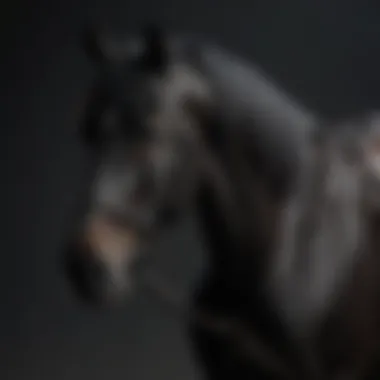
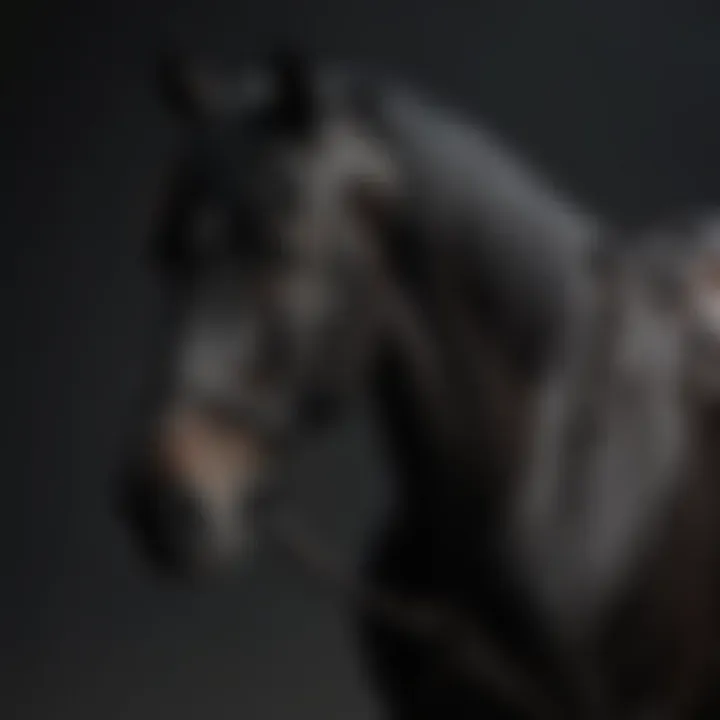
The role of horses transcends their utilitarian purpose. Instead of merely serving as modes of transportation, black horses specifically symbolize power and nobility. They often reflect the inner turmoil or strength of the characters involved. This article will dissect the nuanced relationships between key characters and their dark steeds. By doing so, we can reveal layers of meaning tied to loyalty, betrayal, and the gravity of choices made within the story.
Additionally, a broader historical context enhances our understanding of equine symbolism, as horses have been pivotal in fantasy literature for centuries. The strategic and emotional importance of horses in various cultures resonates throughout different narratives. Consequently, it becomes necessary to explore these themes to grasp the full impact of equestrian imagery in the Game of Thrones universe.
By analyzing these facets, the article aims to illuminate how black horses contribute profoundly to the narrative tapestry of Westeros. Thus, we begin this exploration with a more focused examination of the role of horses in the narrative.
The Role of Horses in the Narrative
In Game of Thrones, horses function as extensions of their riders. They often serve to highlight the personality traits or moral quandaries faced by the characters. Frequently, black horses appear in intense situations, conveying depth to the tone and context of pivotal scenes. Notably, they represent not just physical strength but emotional weight. For example, a character's chosen horse can signify their loyalty, ambition, or underlying darkness.
The bonds between character and horse can also act as predictors of fate. Characters with strong ties to these animals often face significant turning points within the plot. Horses enhance the storytelling by adding layers of symbolism that viewers may interpret in multiple ways, thereby enriching the narrative experience.
Historical Context of Horses in Fantasy Literature
The significance of horses in fantasy narratives has roots in historical lore. In many cultures, horses symbolize wealth and status. From Greek myths to medieval tales, the imagery of dark steeds is frequently associated with nobility and power. In terms of influence, authors such as J.R.R. Tolkien or C.S. Lewis have embedded equine symbolism into their works, emphasizing the relationship between humans and horses.
Fantasy literature also reflects real-world sentiments concerning these noble animals. They are often portrayed as companions, allies, or symbols of freedom and strength. By examining the role of horses in such a context, one can appreciate how they function within Game of Thrones. The series draws on these established motifs, showcasing black horses in ways that resonate with long-held beliefs about power and nobility.
The Symbolism of Black Horses
Black horses hold significant meaning within Game of Thrones. Their presence extends beyond mere transportation, reflecting deeper themes of power, nobility, and complexity. These majestic creatures serve as extensions of their riders' personas and as symbols of their fates in the harsh world of Westeros. Black horses, often associated with strength and dominion, resonate with the intrinsic forces of nature and the darker aspects of human ambition.
Associations with Power and Nobility
The black horse often represents authority and noble stature. In Game of Thrones, key characters ride black horses, enhancing their presence on screen. For instance, Daenerys Targaryen's dragon, Drogon, embodies power and fear, while the black horses of lords and knights reflect their social rank and martial prowess.
The association between black horses and power goes back to historical and cultural contexts. Throughout various cultures, the color black denotes strength, control, and elegance. The visual impact of a rider atop a black steed enhances the character's aura, suggesting an elevated status. Moreover, black horses possess physical attributes that align with these notions; they are often imposing and agile, capable of both speed and endurance.
- Key Attributes of Power and Nobility in Black Horses:
- Physical Grace: Black horses often exude a graceful strength.
- Visual Impact: The contrast of a black horse against vibrant settings creates a striking image.
- Historical Resonance: Cultural meanings often elevate black horses to symbols of nobility.
As characters engage in political maneuverings and battles, their black horses serve to amplify their standing. In battles, the sight of noble lords leading their men on black steeds inspires loyalty and dread, linking the rider's fate with their mount's presence.
The Dark Side of Power
While black horses often symbolize power, they also illustrate the complexities of authority and morality. The darker implications of dominance become evident in character arcs that explore corruption and betrayal. As power corrupts, the black horse embodies the looming threat of loss and chaos.
Characters like Gregor Clegane, known as The Mountain, utilize their black horses to intimidate and exert control over others. The association between the black horse and the darker aspects of power suggests that those who wield it risk becoming secretive and tyrannical.
In Game of Thrones, the narrative often blurs the lines between heroism and villainy. The black horses and their riders become vehicles for exploring such themes.
- Examples of the Dark Side of Power in Characters:
- The Mountain's brutality showcases how power can dehumanize.
- Daenerys Targaryen’s journey reflects the corrupting influence of unchecked power.
- Noble intent can lead to destructive decisions when power is in play.
Ultimately, while black horses signify strength and nobility, they also act as reminders of the potential for downfall and ethical dilemmas. The interplay of power and betrayal adds layers to the narrative, offering a commentary on the nature of authority itself.
Key Characters and Their Black Horses
In the world of Game of Thrones, horses serve as more than mere modes of transport. They are symbols of strength, loyalty, and power. Black horses, in particular, are intricately linked to key characters, emphasizing their personal journeys and the broader themes of the narrative. The black steeds often reflect the darkness or complexity within these characters, influencing perceptions and actions throughout the series.
Daenerys Targaryen and Drogon: The Black Beast
Daenerys Targaryen rides Drogon, the largest and most fearsome of her three dragons. Yet, Drogon can be seen as a black horse in a metaphorical sense. His black scales mirror Daenerys's own tumultuous journey of power and identity. Drogon symbolizes Daenerys’s fierce independence and her connection to her ancestors, particularly the Targaryens, who are often associated with the color black in their legacy.
Drogon not only amplifies Daenerys's fearlessness but also reflects her internal struggle. The bond between Daenerys and Drogon deepens as their paths intertwine, showcasing the idea that power is not just wielded—it is shared and understood through trust and loyalty. This relationship ultimately illustrates how black horses can embody the essence of their riders, illuminating both honor and ruthlessness in their quests.
Ned Stark and His Stark Grey
Ned Stark, though often associated with his grey stallion, plays an essential role in appreciating the symbolism of black horses in the narrative. His horse represents honor and loyalty, traits that Ned embodies completely. However, in the broader landscape of Game of Thrones, the stark contrast of Ned’s noble nature against the backdrop of black steeds can be viewed as an indication of the impending struggle between good and evil in Westeros.
Ned’s connection to his horse emphasizes loyalty that becomes crucial as the series unfolds, serving as a stark reminder of how fragile trust can be in a world filled with betrayal. Though he may not ride a black horse, the black horses of his rivals enhance the narrative's complexity, depicting the shadows that follow him throughout his journey.
The Mountain and His Black War Steed
In stark contrast, the Mountain, known as Sandor Clegane, rides a massive black horse. This connection conveys intimidation and raw force. The Mountain’s horse is not simply a weapon of war; it symbolizes his violent nature and his role within the harsh reality of the series. The black steed embodies death and destruction, paralleling the Mountain’s allegiance to brutality.
The horse amplifies his monstrous reputation while also serving as a tool for his master’s ambitions. The relationship between the Mountain and his war steed represents the ultimate surrender of humanity to primal instincts. The black horse epitomizes his status within the brutal hierarchy of Westeros, reinforcing the idea that power often involves a steep price.
"In the game of thrones, power is as much about perception as it is about action. The horses characters choose reveal their inner truths."
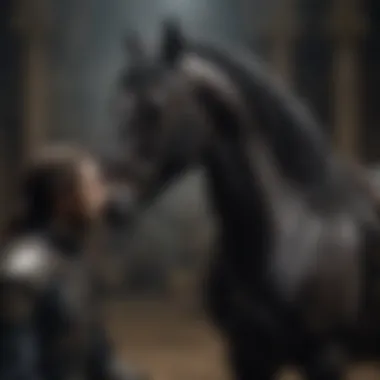
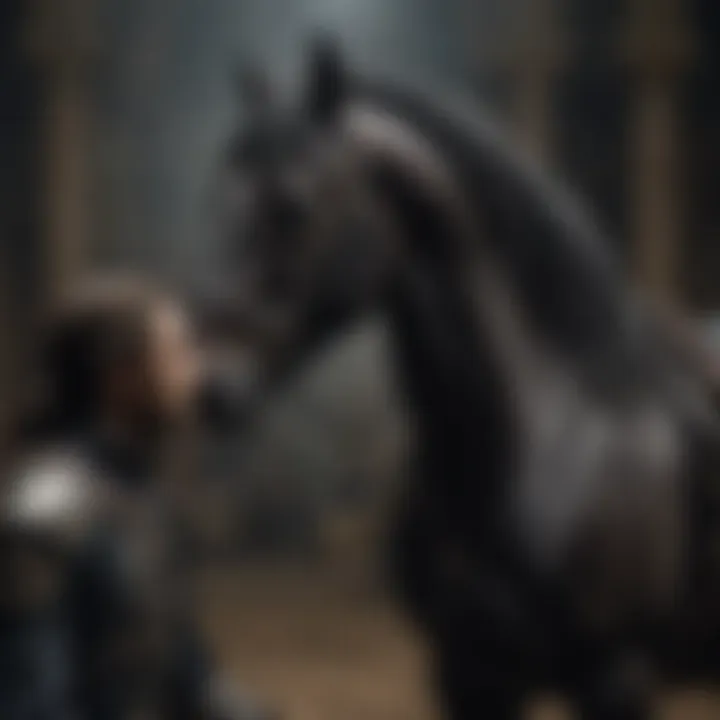
These characters and their black horses emphasize the multifaceted nature of power and loyalty in Game of Thrones. Each relationship highlights the personal traits of the characters involved, shaping the narrative in profound and sometimes unpredictable ways. The interplay between man and horse is essential in understanding the broader implications of loyalty and betrayal throughout the series.
Cinematic Portrayal of Horses
The portrayal of horses in Game of Thrones is not just about their presence on screen. Their cinematic representation holds significant weight in terms of narrative and character development. In this series, black horses serve as potent symbols that align with themes of power, nobility, and even betrayal. When examining the depiction of these animals, one can see how cinematography plays a crucial role in influencing audience perception. Understanding these elements enhances our appreciation for the overall storytelling.
Cinematography and Symbolism
The use of cinematography in Game of Thrones is an art form that enhances the storytelling experience. Black horses are often captured in low-light settings or against dark backdrops, which accentuates their imposing presence. This visual technique supports the symbolism that these beasts represent, making them appear more mysterious and powerful.
Camera angles also contribute to the narrative. For instance, low-angle shots can make the horse and rider seem more dominant and fearsome, which aligns with the show’s complex themes of power. Moreover, the careful framing of scenes allows viewers to see the relationship between characters and their horses, reinforcing trust or foreshadowing betrayal. This deliberate approach to visuals ensures that the audience interprets the black horses not just as animals, but as extensions of the characters they serve.
Directorial Choices: Creating Impact
Directorial decisions play a vital role in how horses, particularly black ones, are portrayed in Game of Thrones. Directors often choose specific moments to highlight the bond between horse and rider, which enhances emotional resonance. For example, scenes where a character loses a black horse can symbolize personal loss or a shift in loyalty.
In addition, directors weave black horses into key plot points. The impact is profound when a prominent character is seen riding a dark steed into battle. Such choices create a visual shorthand for the character's status and intentions. This movement and the accompanying emotional music heighten the stakes.
"The horse is a crucial element, serving as a mirror to the character's inner turmoil and strengths."
These directorial choices contribute to the storytelling of Game of Thrones. By intertwining horses with pivotal moments, the series offers a multilayered narrative where equine symbolism enriches viewer engagement with the characters and their journeys.
The Lore Behind the Black Horse
The lore surrounding black horses in the Game of Thrones universe is rich and multifaceted. It serves as a lens through which we can explore the intricate themes of loyalty, power, and the underlying darkness that exists in both characters and the world they inhabit. Understanding this lore allows fans to appreciate the deeper meanings embedded within the narrative, especially as these animals become extensions of the characters themselves.
In Westerosi culture, horses are often revered. They symbolize not only nobility but also the bond between man and beast. Black horses, in particular, have a significant place in this symbolism. Their color is not just a surface characteristic; it embodies the complex emotions and themes prevalent in the story. The presence of black horses frequently signifies a character's journey into darker territories—both literally and figuratively.
Origins in Westerosi Culture
In the lore of Westeros, black horses often denote an important status among the noble houses. It's not merely about the animal's breed but rather their connection to identity and power.
- Noble Lineage: For great houses like the Targaryens, black horses are part of their heritage. They reflect the fierce spirit and determination required to maintain their rule.
- Symbolism of Strength: A black horse can represent a character's strength. It is an animal that carries the weight of its rider's ambitions and conflicts. The very essence of the black horse can evoke images of a character's struggles, whether they are internal or external.
- Cultural Representations: Various cultures within the Game of Thrones realm have legends that reinforce the presence of black horses as symbols of power, chaos, or even death. They can be seen as omens, marking significant turning points in the story.
Legends Surrounding Black Horses
Legends add another layer to the symbolism of black horses. They are often steeped in fantasy, folklore, and local myths that inform the characters' perceptions of these powerful animals.
- The Dread Steed: In some tales, black horses are portrayed as creatures of shadow, often said to be linked with the supernatural or the underworld. This connection reinforces the idea of menace and foreboding, reflecting characters' fates when they choose to align with darker powers.
- Ghostly Riders: Stories abound of riders who meet untimely fates while riding black horses. Such tales illustrate how intertwined the destiny of the rider is with that of the horse, suggesting a bond that transcends life and death.
- Mythological Echoes: In various cultures, black horses appear in myths as symbols of vengeance or justice. Their legacy can serve to enhance a character's own narrative arc, reflecting the trials they face in their journey.
Themes of Loyalty and Betrayal
In the intricate world of Game of Thrones, themes of loyalty and betrayal are paramount. These themes parallel the relationships between characters and their horses, especially the black steeds that often symbolize deeper connections and commitments. Horses serve not only as companions but also as extensions of their riders' identities. They reflect the trust placed in one another. This connection showcases loyalty, not just as an abstract idea but as a tangible relationship that can be seen on the battlefield or in personal moments.
Loyalty in Game of Thrones is complex and layered. The bonds created between characters and their horses are often deeper than those between people. A horse can embody the reliability that a character desperately seeks but may not find in their allies. This relationship can amplify the stakes of loyalty and betrayal, making the stakes feel more personal. Often, when a rider loses their horse or their trust is shattered, it signifies a larger crisis, echoing their own vulnerabilities and moral dilemmas.
Additionally, exploring these themes through horses adds nuance to understanding character decisions. When characters face betrayals or struggles, their horses often become silent witnesses to these conflicts. In moments of turmoil, the presence of a horse can provide comfort or indicate the weight of betrayal. The choice to ride or not ride, to trust or distrust, becomes metaphoric. As the narrative unfolds, one can see how loyalty is not just a virtue but a fragile aspect influenced by external forces.
Horses as Symbols of Trust
Horses often represent the trust that bonds the rider and the steed. In Game of Thrones, several key relationships highlight this symbolism clearly. For example, Daenerys Targaryen's relationship with Drogon showcases a profound bond forged through trust. This trust evolves throughout the series and illustrates how significant it is for both character development and the overarching narrative.
Black horses serve a vital role in this context. Their imposing presence and power suggest strength, yet they can also reflect the emotional weight of trust that can easily be tainted by betrayal. This symbol is matched by its narrative function as characters face inner moral conflicts, revealing how essential it is to maintain loyalty within the chaos of war and politics.
"A horse is a bridge between the rider and a promise of loyalty."
The Fragility of Loyalty in War
The backdrop of war in Game of Thrones intensifies the fragility of loyalty. Allies can quickly turn into enemies. The stakes are high, and characters must navigate their relationships carefully. The symbolism of horses often becomes a means to express this turmoil. In critical moments, decisions about loyalty become overly complicated as characters must weigh personal allegiances against survival.
When a rider loses a trusted mount, it can symbolize more than the loss of a steed. This event often signals a turning point in their story, a betrayal not just of the horse but of their own ideals. Such instances are a reminder that loyalty, while powerful, is often tested in the harshest of ways.
As conflicts escalate, the significance of equine loyalty reflects human frailty. Riders must confront the consequences of their choices, and the bonds forged in the past can quickly unravel. Through this prism, the black horse stands not only as a noble creature but also as a poignant reminder of how deeply loyalty can impact one’s fate in the brutal world of Westeros.
Unique Characteristics of Black Horses
The unique characteristics of black horses play a crucial role in enhancing the narrative depth of Game of Thrones. These horses, often associated with major characters, represent an array of themes including power, mystery, and depth of character. Understanding these traits helps in decoding the subtleties that underline the associate narrative arcs. The physical and behavioral aspects of black horses contribute to their symbolism in the series, making them not just mounts but significant players in the stories of their riders.
Physical Aspects and Attributes
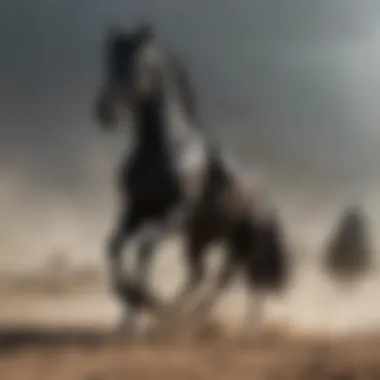
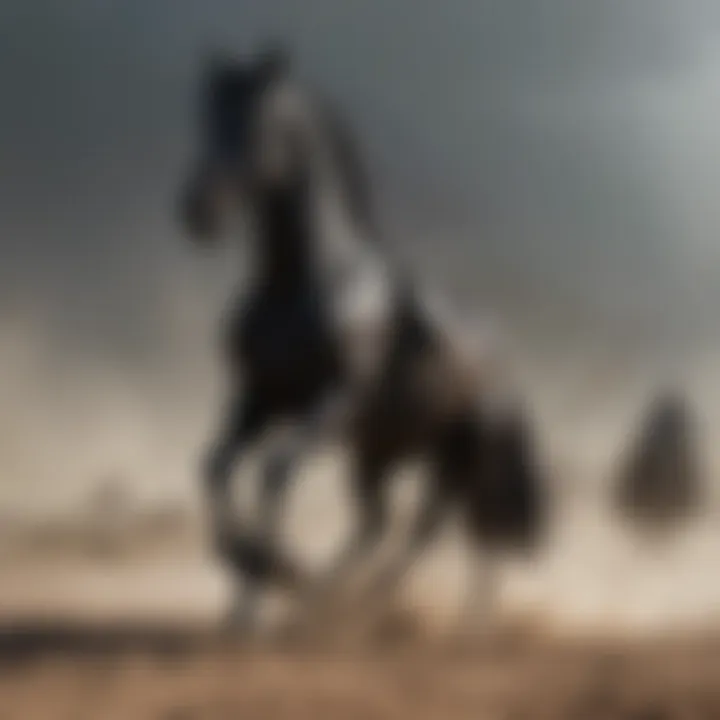
The physical qualities of black horses are striking and often embody strength and grace. The shiny coats of these horses are visually captivating, making them stand out in the often bleak landscapes of Westeros. Moreover, their size varies from sleek and agile to strong and robust, suitable for both kings and warriors alike.
In the context of the series, black horses are commonly depicted in situations of conflict or power, reinforcing their association with nobility and strength. For instance, the Mountain’s black war steed symbolizes brute force and fear, contrasting with the more graceful yet powerful Drogon, Daenerys Targaryen's dragon, who also exhibits characteristics of a black horse: intimidating presence coupled with loyalty.
Other attributes worth noting:
- Endurance: Black horses are often bred for their stamina, representing the relentless spirit of their riders.
- Intelligence: These horses display a keen understanding of their surroundings, showcasing the mental strength that parallels their riders’ cunning.
- Elegance: The aesthetic appeal of black horses communicates power and primal energy, capturing the viewer's attention during pivotal scenes.
Behavioral Traits of Dark Horses
Behaviorally, black horses often embody a range of traits that enhance their symbolic presence in Game of Thrones. Their temperament can reflect the nature of their riders and the various cultures in Westeros. Black horses are generally known for being more spirited, responsive, and sometimes unpredictable. This mirrors the complexities of the characters they serve.
A few key behavioral aspects include:
- Loyalty: Black horses are noted for their loyalty to their riders. This trait is portrayed throughout the series, emphasizing the trust relationships that develop between a knight and their steed.
- Courage and Bravery: In moments of battle, these horses display extraordinary courage, charging with their riders into the fray, which symbolizes the unyielding spirit of the characters they accompany.
- Reactivity: Their sometimes skittish nature serves as a foil to the calmness of their riders, heightening the tension in key moments. This unpredictability can also mirror the uncertainty of the political landscape within the series.
"In Game of Thrones, the manipulation of equine representation paves the way for deeper connections between the viewer and the narrative."
Cultural Meanings of Black Horses
The exploration of cultural meanings surrounding black horses offers valuable insights into their significance within the broader narrative of Game of Thrones. Horses, especially black ones, embody various symbolic attributes, reflecting factors such as power, mystery, and even danger. In many cultures, black horses are often viewed through a lens of duality—both majestic and sinister. This duality manifests in the way characters within the series interact with these animals, shaping their stories and, in turn, their destinies.
Understanding the cultural context provides depth to character decisions and their consequences. The image of a black horse can evoke emotional responses, influencing how audiences perceive pivotal moments in the series. Furthermore, it enhances viewer engagement, connecting them to a rich tapestry of folklore and tradition that transcends the confines of Westeros. The interplay between myth and reality is crucial for grasping the nuances of equine symbolism.
Global Perspectives on Black Horses
Black horses have held notable positions in various cultures around the world. In many traditions, their color symbolizes strength and nobility. For example, in ancient European cultures, black horses often signified warriors and were associated with battles and heroic tales. Similarly, in Asian cultures, black stallions represent power and dominance. Their presence in folklore often accompanies stories of brave knights and legendary figures.
The idea of black horses also ties closely to spiritual symbolism. In some Native American tribes, the black horse is thought to be a messenger between the physical and spiritual worlds. The varying perspectives highlight how black horses are not merely beasts of burden, but rather, they embody complex traits that resonate across different societies.
Symbolism Across Different Cultures
The symbolism of black horses differs widely, depending on the cultural backdrop. Here are a few significant associations made around the world:
- Strength and Power: In many cultures, a black horse is synonymous with formidable strength, representing authority in battles.
- Mystery and Elegance: Black horses often evoke mysteries due to their striking appearance. This quality can be seen in literary representations as both alluring and intimidating.
- Spirituality: In some traditions, black horses serve as spiritual guides, believed to connect humans to divine wisdom.
- Death and the Afterlife: Contrarily, in certain cultures, the black horse symbolizes death or transition. This dual perception adds layers to the characters that ride them in the Game of Thrones universe.
The diverse symbolism surrounding black horses encapsulates a wealth of meanings, all of which contribute to the multifaceted narrative woven within the series. Black horses serve to mirror human emotions, aspirations, and fears, showcasing how these animals are deeply intertwined with individual journeys and the collective lore of the fantasy narrative.
Comparative Analysis with Other Fantasy Series
The exploration of equine symbolism within Game of Thrones invites a broader perspective when compared to other fantasy series. This comparison highlights the unique aspects that characterize horses, specifically black horses, as symbols of power and conflict. In doing so, it enhances understanding of the themes presented in George R. R. Martin's work.
One critical element to consider is how black horses are utilized in various narratives outside of Game of Thrones. For instance, in J.R.R. Tolkien's The Lord of the Rings, horses play significant roles as companions to characters like Aragorn and Gandalf. However, the representation of a black steed carries a different weight. Shadowfax symbolizes purity and power, standing in contrast to the dark connotations of black horses seen in Westerosi lore. This difference prompts readers to contemplate the inherent values from one universe to another.
Another essential consideration is the evolution of equine roles across fantasy literature and media. Many series often depict horses as mere mounts, relegating them to the background. In contrast, Game of Thrones positions horses, particularly the black ones, as integral to character development and theme exploration. This depth is underlined when examining the bond between the rider and the steed, revealing nuanced relationships that depict personal struggles and power dynamics.
"A horse is a projection of our dreams about ourselves, strong, powerful, and beautiful." Although this statement applies broadly, in the context of Game of Thrones, it resonates particularly regarding the black horses that embody both the virtues and flaws of their riders.
Uncovering these comparisons allows for an enriched understanding of how equine symbolism operates within different narratives. This analysis reveals not only the unique contributions within Game of Thrones, but also positions it within a larger framework of equine mythology in fantasy storytelling.
Black Horses in Other Media
The presence of black horses in fantasy media offers insight into themes of darkness and mystery. In multiple series, including those like Shadow and Bone, black steeds often serve as harbingers of fate or internal conflict. Their stark pigmentation symbolizes not just physical attributes but often represents the moral ambiguities of the characters associated with them.
For example, in The Witcher, the black horse, known as Roach, showcases a connection to Geralt's complex identity. Similar to the context in Game of Thrones, the presence of a dark horse intricately weaves into the protagonist's narrative, revealing layers of their character through their choice of steed.
The Evolution of Equine Symbolism
Tracking the evolution of equine symbolism across various fantasy series helps illuminate its significance in shaping narratives. Historically, horses have been viewed as symbols of status and nobility. In ancient cultures, they were seen as imperative to warfare and transportation.
In modern fantasy, black horses frequently carry darker undertones. They signal power, but also foreshadow betrayal and tragedy. The transition from majestic creatures to embodiments of personal and communal conflicts marks a significant shift in the portrayal of black horses. Readers who engage with fantasy media see that these creatures evolve from traditional symbols of regality to complex symbols laden with emotional weight. This evolution highlights a deeper exploration of human anxieties, desires, and moral conflicts, enriching the overall tapestry of storytelling.
Understanding how black horses have transitioned in these different narratives offers clarity regarding their role in Game of Thrones. The rich layers they provide act as mirrors reflecting broader themes that resonate universally within the fantasy genre.
End: The Enduring Legacy of Black Horses
The significance of black horses in Game of Thrones cannot be underestimated. Their presence is woven intricately into the character arcs and narrative developments throughout the series. Black horses serve not only as mounts, but also as symbols of strength, loyalty, and the dark dualities within the characters they are paired with. As we analyze the stories, it becomes evident that these animals are more than mere assets; they carry the weight of their riders' ambitions and moral complexities.
The Role of Black Horses in Shaping Character Arcs
Black horses have played transformative roles for key characters in the series. Daenerys Targaryen’s bond with Drogon exemplifies how a black horse can mirror emotional and power dynamics. Drogon's fierce nature echoes Daenerys's fiery determination, illustrating the connection between rider and steed. Similarly, The Mountain’s imposing black war steed accentuates his intimidating presence and represents a dark aspect of strength in the narrative. Each horse’s characteristics and color enhance the storytelling. They are as much a part of the characters' identities as their choices and actions.
Final Thoughts on Their Symbolism
The symbolism of black horses extends into the very fabric of Game of Thrones. They represent not only power but also the complexities of loyalty and betrayal present in the series. The darker hues lend themselves to themes of ambition, dominance, and morality's fine line.
In many cultures, black horses are seen as symbols of mystery and strength, often associated with noble bloodlines. In Game of Thrones, this is reflected in the lineage of characters who ride them and the destinies they forge. As such, black horses stand as enduring icons of equine symbolism in the Game of Thrones universe, enriching the narrative with their profound significance.



